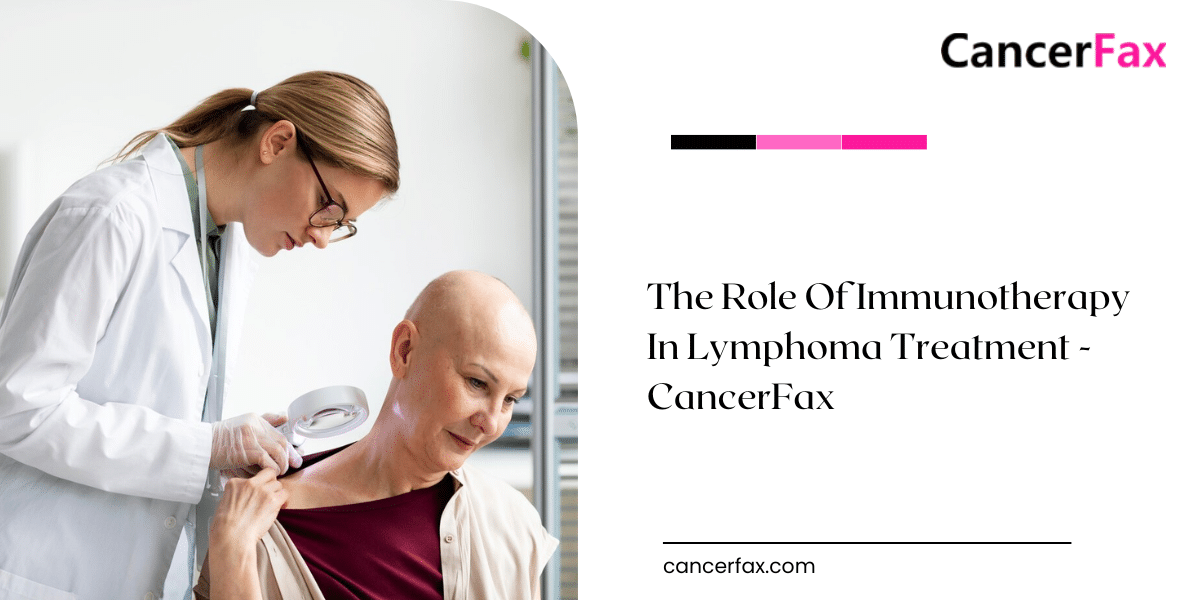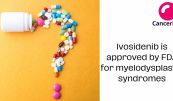The Role Of Immunotherapy In Lymphoma Treatment
If you’re reading this, you or maybe one of your loved ones is on a journey that no one ever plans to take—the path of facing cancer.
We understand that this road is filled with uncertainties, fears, and moments when it feels like the world has turned upside down. But there’s good news for you, which might end your worries!
Let’s talk about something that might bring a golden ray of hope to your journey – immunotherapy.
It’s more than simply medicine; it’s a ray of hope and a constant reminder that you are not alone, science is fighting with you.
In this blog, we’re going to discuss the important role of immunotherapy in lymphoma treatment, which is giving cancer patients new hope.
We’ll show you how car t cell therapy treatment in India is way smarter and more effective than other medical procedures. So, stick around, and let’s discover the amazing benefits of immunotherapy for lymphoma together!
What Is Lymphoma?
Lymphoma is a form of cancer that begins in our lymphatic system, which is an important part of our immune system.
It is a type of white blood cell that is formed in the bone marrow. These lymphocytes circulate throughout our bodies via the blood and lymphatic systems.
The lymphatic system, which contains vital components such as lymph nodes, serves as a defender by filtering lymph fluid to remove foreign particles.
Various types of lymphocytes, including B cells, T cells, and natural killer (NK) cells, grow inside lymph nodes to attack the bacteria and invaders present in lymph fluid.
Lymphomas occur when healthy lymphocytes change into cancerous cells. This divides lymphomas into three types: B cell lymphomas (the most prevalent), T cell lymphomas, and NK cell lymphomas (less common but possible).
Even though dealing with lymphoma is quite tricky, modern approaches like car t immunotherapy for lymphoma are providing us hope and empowering our immune system to fight strong despite the challenges it brings.
Types Of Lymphoma
Lymphoma mainly affects children and young adults and it is divided into two types –
Hodgkin Lymphoma (HL)
This type of lymphoma is characterized by the presence of a specific abnormal cell called Reed-Sternberg cell.
Hodgkin lymphoma often starts in the lymph nodes and can spread to other parts of the body. It is relatively less common than non-Hodgkin lymphoma.
Non-Hodgkin Lymphoma (NHL)
This is a more common and diverse group of lymphomas that includes various subtypes. Non-Hodgkin lymphomas can arise from several types of lymphocytes and can affect the lymph nodes, spleen, bone marrow, and other organs.
How CAR T For Lymphoma Is Rewriting the Rules of Cancer Care?
India has just introduced its most powerful and effective approach to helping people suffering from lymphoma. This new immunotherapy treatment for lymphoma is similar to giving your immune system a powerful upgrade.
CAR T stands for “Chimeric Antigen Receptor T-cell,” which might sound complicated, but it’s basically the best way to supercharge our immune cells.
Doctors take some of our own immune cells, modify them in the lab to recognize and target lymphoma cells, and then reintroduce them into our bodies to identify and eliminate cancer cells.
According to studies, CAR T-cell therapy has a high success rate, with a considerable percentage of patients responding positively.
For example, in clinical trials for specific forms of lymphomas, response rates have exceeded 80%, indicating a significant influence on the disease.
This therapy is especially beneficial for patients who have not responded well to standard therapies. The cost of car t cell therapy in India is approximately $57,000.
However, in the upcoming days companies like Immuneel and Cellogen will launch their new CAR-T treatment which will range from $30,000 to $40,000.
How Immunotherapy For Lymphoma Cancer Is Different From Conventional Therapies?
Alright, let’s break it down! Immunotherapy treatment for Hodgkin’s lymphoma and Non-Hodgkin lymphoma have huge success rates compared to conventional treatments.
Chemotherapy-
It is a powerful treatment that uses intravenous or oral drugs to systematically target and destroy cancer cells throughout the body.
While chemotherapy is effective against lymphoma, it can also have a negative influence on healthy cells, resulting in serious side effects.
Radiation therapy
This therapy is often paired with chemotherapy and uses high-energy X-rays to directly target lymphoma cells that have gathered in lymph nodes.
Stem Cell Transplants
Stem cell transplants, commonly known as bone marrow transplants, may be required since chemotherapy and radiation therapy can damage healthy blood cells as well as cancer cells. This treatment replaces healthy blood cells to support recovery.
Photopheresis
It is a type of photoimmunotherapy that uses light to activate the immune system in the fight against specific types of lymphoma which can be caused by stem cell transplantation.
Phototherapy
Phototherapy appears to be a promising treatment option for early-stage cutaneous T cell lymphoma. It uses ultraviolet (UV) light to target and destroy skin cancer cells.
Surgery
Even though surgery is often used to diagnose lymphoma, there are some situations in which tumor eradication through surgical resection is considered suitable.
A Closer Look At Immunotherapy’s Side Effects
Learn about the side effects of immunotherapy in the treatment of lymphoma. The impact varies from person to person, depending on whether it’s immunotherapy for Hodgkin’s lymphoma, immunotherapy for follicular lymphoma, or immunotherapy for large b cell lymphoma. However, some of the common immunotherapy for lymphoma side effects are as follows –
Fatigue
Skin Reactions
Flu-Like Symptoms
Nausea and Vomiting
Diarrhea or Constipation
Loss of Appetite
Blood Clots
Dizziness Or Confusion
Headaches
Low Blood Cell Count
Understanding The Types Of Immunotherapy Treatment Option
The Role of Immunotherapy in Lymphoma Treatment is very crucial as these innovative approaches are reshaping cancer treatment. Let’s find out how these special therapies, from antibodies to vaccines, are changing the game in fighting cancer.
Monoclonal Antibodies
Monoclonal antibodies are laboratory-created molecules that replicate the immune system’s ability to fight against harmful cells. They function by attaching to specific proteins situated on the surface of cancerous cells.
These antibodies can prevent cancer cells from growing uncontrollably, help the immune system detect cancerous cells for targeted elimination, or initiate a process that causes the cancerous cells to undergo self-destruction. This is a very effective B-cell lymphoma immunotherapy.
Immune Checkpoint Inhibitors
This is the most effective immunotherapy for t cell lymphoma. Immune checkpoint inhibitors block certain proteins on immune cells or cancer cells, allowing the immune system to recognize and attack cancer cells more effectively.
Within the immune system, normal cells have a protein checkpoint that makes bonds with proteins in T cells, signaling the T cells to stop attacking.
Cancer cells, on the other hand, can deceive the immune system into mistaking them for healthy cells. Inhibitors intervene by disrupting these protein pairings, ensuring that T cells accurately identify and launch an attack against lymphoma cells.
Cellular Immunotherapy
Cellular immunotherapy is the process of modifying a patient’s own immune cells (typically T cells) in order to improve their ability to identify and eliminate cancer cells.
CAR T-cell therapy (Chimeric Antigen Receptor T-cell) is a notable example of cellular immunotherapy. In this approach, T cells are genetically engineered to express a receptor that recognizes cancer cells, creating a powerful and personalized anti-cancer response.
Therapeutic Cancer Vaccines
Therapeutic cancer vaccines stimulate the immune system to recognize and fight cancer cells. Unlike standard vaccines, which try to prevent diseases, these vaccines aim to cure existing tumors.
These vaccines can be designed to target specific proteins in cancer cells and stimulate an immune response against the cancer.
Real Lives Touched by Immunotherapy Treatment
Meet Shawn, a brave 29-year-old boy from Hong Kong whose cancer journey began with symptoms of fever, tiredness, and pale complexion in March 2017.
Shawn started induction treatment at the Prince of Wales Hospital after being diagnosed with acute B-lymphocytic leukemia. After successful chemotherapy and radiation treatment, he appeared to be fit and fine by April.
However, a bone marrow examination on April 19, 2018, found a 10% presence of juvenile gonorrhea. Faced with this challenge, Hong Kong specialists suggested that traditional chemotherapy might not be enough and suggested CAR-T treatment as a more promising option.
It was then Shawn decided to participate in a clinical study, undergoing genetic modification of his T-cells to create “chimeric antigen receptor (CAR) T-cells.” These unique cells are made to specifically target cancer cells.
On May 6, Shawn had another round of chemotherapy. On May 11, he received an infusion of CD19 CAR T cells. Comprehensive reports revealed no anomalies in CSF correlation, flow cytometry, bone marrow cell morphology, DNA testing, or the CAR-T report following four weeks of close monitoring and side-effect management.
Shawn had achieved complete recovery, marking a tremendous success in his battle against cancer. After such a remarkable recovery, Shawn is getting ready for the next stage of his journey—a bone marrow and blood transplant when he gets back to Hong Kong.
His motivational tale highlights the revolutionary Role of Immunotherapy in Lymphoma Treatment and in defeating a deadly disease like cancer.
Let’s Defeat Cancer Together!
As we wrap up our exploration into the world of immunotherapy for lymphoma treatment, let’s hold onto something important – hope.
Consider immunotherapy or CAR-T Cell Therapy as a superhero on your cancer-fighting team, providing a fresh approach to those difficult times.
Each success story, every step forward in science, is like a bright light in the journey against cancer. If you or someone you know is on this journey, remember that you’re stronger than you think, and every step you take towards this treatment is a win.
So let us face it together since hope is our most powerful weapon in the fight against cancer. You’re not alone, and the road ahead is filled with possibilities for a brighter, healthier tomorrow. Reach out to us today to change this challenging journey into a brighter tomorrow!
Dr. Nishant Mittal is a highly accomplished researcher with over 13 years of experience in the fields of cardiovascular biology and cancer research. His career is marked by significant contributions to stem cell biology, developmental biology, and innovative research techniques.
Research Highlights
Dr. Mittal's research has focused on several key areas:
1) Cardiovascular Development and Regeneration: He studied coronary vessel development and regeneration using zebrafish models1.
2) Cancer Biology: At Dartmouth College, he developed zebrafish models for studying tumor heterogeneity and clonal evolution in pancreatic cancer.
3) Developmental Biology: His doctoral work at Keio University involved identifying and characterizing medaka fish mutants with cardiovascular defects.
4) Stem Cell Research: He investigated the effects of folic acid on mouse embryonic stem cells and worked on cryopreservation techniques for hematopoietic stem cells.
Publications and Presentations
Dr. Mittal has authored several peer-reviewed publications in reputable journals such as Scientific Reports, Cardiovascular Research, and Disease Models & Mechanisms1. He has also presented his research at numerous international conferences, including the Stanford-Weill Cornell Cardiovascular Research Symposium and the Weinstein Cardiovascular Development Conference.
In summary, Dr. Nishant Mittal is a dedicated and accomplished researcher with a strong track record in cardiovascular and cancer biology, demonstrating expertise in various model systems and a commitment to advancing scientific knowledge through innovative research approaches.
- Comments Closed
- December 13th, 2023






bispecific antibodies lymphoma, CAR T-cell therapy lymphoma, checkpoint inhibitors lymphoma, Hodgkin's lymphoma immunotherapy, immunotherapy side effects lymphoma, Lymphoma immunotherapy, NHL immunotherapy options, PD-1 inhibitors cancer
CancerFax is the most trusted online platform dedicated to connecting individuals facing advanced-stage cancer with groundbreaking cell therapies.
Send your medical reports and get a free analysis.
🌟 Join us in the fight against cancer! 🌟
Привет,
CancerFax — это самая надежная онлайн-платформа, призванная предоставить людям, столкнувшимся с раком на поздних стадиях, доступ к революционным клеточным методам лечения.
Отправьте свои медицинские заключения и получите бесплатный анализ.
🌟 Присоединяйтесь к нам в борьбе с раком! 🌟